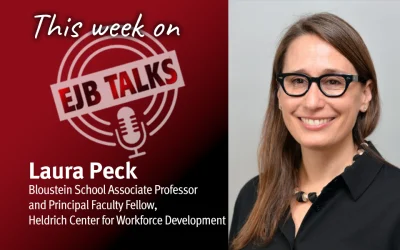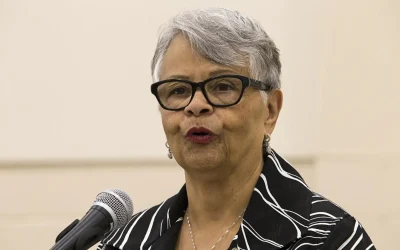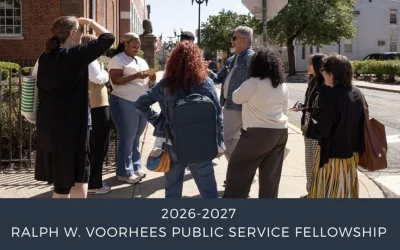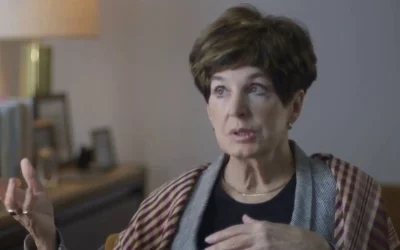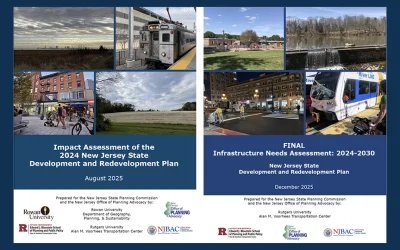News
Why this political deal between 2 governors matters for millions of New Jersey and New York commuters
“I think the governor is doing the right thing by having a deputy executive director who should be at the table,” Hughes said of Sherrill.
EJB Talks: Beyond “Does It Work?”
EJB Talks returns for Season 14 with Dean Stuart Shapiro speaking with new Public Policy professor Laura Peck. Laura discusses her journey from undergraduate activism to policy analysis, a PhD, tenure at Arizona State, and more than a decade at Abt Associates. She shares how that work shaped her focus on careful, policy-relevant research, specifically taking about her evaluation of the federal Health Profession Opportunity Grant (HPOG) program.
Heldrich Center: Motivational Texts and Unemployment
“This is a group that’s experiencing real life hardship — this period of unemployment, of having to receive unemployment insurance benefits, not knowing what their future looks like. I would love to see that qualitative component … Maybe it did make a little bit of difference in how they felt about their experience knowing that they had a little more motivation,” Walsh said.
Princeton Democrats Take a Close Look at 17 Candidates Hoping to Succeed Bonnie Watson Coleman – and the Winner Is . . .
Elections and ballet reform advocate Julia Sass Rubin, associate dean of Academic Programs at the Bloustein School, Rutgers University, noted that “tonight’s forum in terms of the health of democracy was very exciting. It is incredible that we have 17 candidates. We do not know yet if each candidate will get the number of petition signers to qualify for a position on the ballot, but still the interest is awesome,”
Accepting Applications for 2026-27 Voorhees Public Service Fellowship
Guest Speaker Lerrel Pinto: Robot Data is Not Enough Data
“There are a lot of people who are more than happy to use AI for entertainment,” Samuel said. “But when it comes to decision making, a lot of people go back to fundamental information based, fact-based decision making.”
Stamato Commentary: Black History Month and the battle over America’s story
Today, invisibility is failing. Powerful forces are restoring attention to stories long suppressed. Films, books, magazines, classrooms and museums finally are giving those histories their due. In Washington, D.C., the National Museum of African American History and Culture stands as a splendid example.
State Planning Commission Adopts NJ State Plan, Needs Assessments
The New Jersey State Planning Commission has adopted an updated State Plan, along with a new Impact Assessment and Infrastructure Needs Assessment, marking the first comprehensive update since 2001. The Plan will guide coordinated state and local decision-making on land use, transportation, housing, infrastructure, and climate adaptation.
Zhang et al. Assess Greenspace and CVD Risk Using Nurses
This study demonstrates that disaggregating greenspace is critical for understanding its cardiovascular effects. In a large, nationwide prospective cohort, higher exposure to street-view visible trees was associated with lower cardiovascular disease incidence, while grass and other low-lying greenspace were associated with higher risk.
Saks Fifth Avenue to close American Dream store. Here’s why
All three are in “strong affluent market areas,” said James Hughes, a professor of urban planning and policy development at Rutgers University in New Brunswick.
“So all locations have high market potential for repurposing — demonstrated strong consumer purchasing power,” Hughes wrote in an email.
Livingston Mall is dying. See how NJ malls are reinventing themselves
“The town — if it’s a redevelopment area — is in the driver’s seat,” said James Hughes, a professor of urban planning and policy development at Rutgers University in New Brunswick. “They could acquire the land and totally control it.”
Trump Decries a ‘Nation of Renters’ but His New Policy Promotes One
The author cites a recent report from the New Jersey State Policy Lab, Trends in Investor Acquisition of Residential Properties in New Jersey, which highlights that while investor activity impacts affordability and inventory, large investors are not the primary reason homes are expensive.


